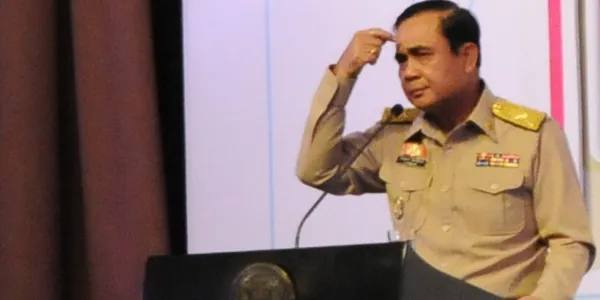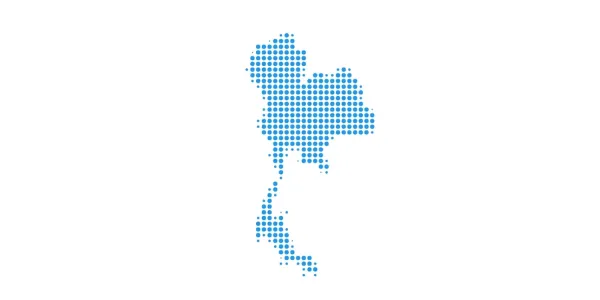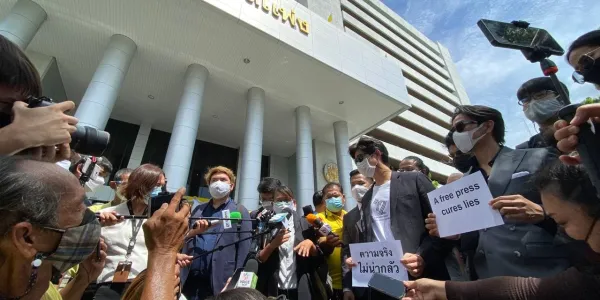By Prachatai |
<p>Gen Prayut Chan-o-cha has withdrawn the 29th order under the Emergency Decree that banned the distribution of information causing fear or public disorder regardless of its veracity. This follows a Civil Court ruling to suspend the order on the grounds that it was unconstitutional and exceeded the powers of the government.</p>
By 17 undersigned Civil Society Organizations, see at the end of the article. |
<p>17 international human rights organizations denounced the Thai government’s newly announced Regulation No. 29, which empowers the authorities to censor online expression, and investigate and prosecute individuals responsible for communications that may “instigate fear”. The Regulation is the government’s latest attack on the right to freedom of expression and information in Thailand.</p>
By Prachatai |
<p>media agencies and a civil society group filed a complaint against Gen Prayut Chan-o-cha as the Prime Minister and head of the Centre for COVID-19 Situation Administration (CCSA) over the 29th order under the Emergency Decree banning distribution of information causing public fear or misinformation.</p>
<p>The Thai media regulator has suspended a news programme on Voice TV, a digital TV channel owned by Panthongtae Shinawatra, the son of controversial former Prime Minister Thaksin.</p>
<p>The National Broadcasting and Telecommunications Commission (NBTC) on Monday, 29 August 2016, voted 3 to 1 to suspend transmission for seven days of Wake Up News, a popular morning news programme of Voice TV. </p>
<p>As the referendum on the junta-sponsored draft charter draws near, the Thai junta leader has given power to a national media regulator to close down media critical of the regime without any accountability. </p>
<p>The Royal Gazette website on Thursday, 13 July 2016, published the latest order of the Thai junta, <a href="http://www.ratchakitcha.soc.go.th/DATA/PDF/2559/E/158/24.PDF">the National Council for Peace and Order (NCPO) Head’s Order No. 41/2016</a>.</p>
<p>Media experts have pointed out that the military regime uses the 2008 broadcasting law and a broadcasting regulatory agency as a media control apparatus. </p>
<p>According to <a href="http://ilaw.or.th/node/3941">iLaw</a>, the Office of the National Broadcasting and Telecommunications Commission (NBTC) and the Professionals of Broadcasting Council (PBC) (Thailand) on 18 November 2015 co-organised a seminar titled ‘Law vs. Production of TV Programmes’ at the Royal Thai Army Club in Bangkok.</p>
<p>Thailand’s telecommunication authorities have admitted that a plan to reduce the number of internet gateways down to one is for ‘national security’, but added that it will also boost the country’s IT capacity to compete with other nations.</p>
<p>The Thai authorities have given the green light to a bill to establish a National Media Council, saying that it will improve media ethics and freedom. However, some say that the bill will do the opposite.</p>
<p>According to <a href="http://www.posttoday.com/politic/377369">Post-today news</a>, on Monday, 20 July 2015, a majority of National Reform Council (NRC) members voted to approve a bill to protect media freedom. 167 NRC members voted in favour of the bill while 20 voted against it. 27 members abstained.</p>
<p>The Thai Public Broadcasting Service (Thai PBS), a public media outlet supported by the state, might face a 50,000 baht fine from the Thai authorities for broadcasting a programme on the background of the 14 embattled anti-junta student activists.</p>
<p>Thai authorities have suspended the broadcasting license of a TV station affiliated with the anti-establishment red shirts for allegedly showing programmes which are threats to national security.</p>
<p>Thai authorities have shut down two satellite TV stations affiliated with the anti-establishment red shirts for seven days in the name of national security.</p>
<div><a href="http://www.khaosodenglish.com/">Khaodsod English</a>: Thailand's top media regulatory board has launched an investigation into a state-owned TV station after one of its anchors misidentified a member of the Royal Thai Family in a news program. </div>
<div> </div>
<div>Lt.Gen.
</div>



